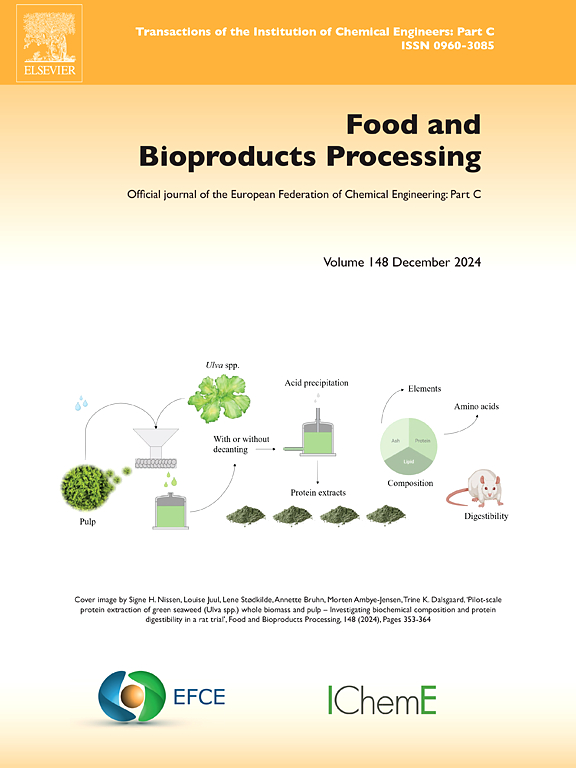Effects of bamboo powder on nitrogen dynamics and microbial succession in kitchen food waste composting
IF 3.4
2区 农林科学
Q2 BIOTECHNOLOGY & APPLIED MICROBIOLOGY
引用次数: 0
Abstract
Nitrogen is an important element in the composting process and one of the main components of microbial cells. In this study, bamboo powder and perishable organic waste were used as raw materials to construct a composting system with a 10 % mass ratio of microbial agents. The composition, structure and functional genes of bacteria during composting were analysed by high-throughput sequencing technology. The thermal period of the compost was extended by 7 days after the addition of bamboo powder, and the abundance of the bacterial community increased. Firmicutes, Proteobacteria, Actinobacteria and Bacteroides were the main dominant compost phyla, and their presence promoted the significant enrichment of Bacillus palustris and cellulobacteria. The addition of bamboo powder significantly increased the concentrations of ammonia nitrogen (NH4+-N), nitrate nitrogen (NO3--N), and other nutrients. After treatment, the seed germination index was 2.8 times greater than that of the control group, and the EC decreased to 1.5 mS/cm, which was conducive to conversion into organic fertilizer. The results of the multifactor analysis showed that after the addition of bamboo powder, Corynebacterium, Ochrobactrum and Streptomyces are the key bacterial genera that can affect nitrogen conversion during composting. The metabolic function of bacteria was predicted based on the KEGG (Kyoto Encyclopedia of Genes and Genomes) database, which includes information on various metabolic pathways, such as amino acid transformation and genetic information processing. The addition of bamboo powder increased the maturity and nutrient content of the compost products and changed the dynamics of the compost bacterial community.
竹粉对厨余垃圾堆肥中氮动态及微生物演替的影响
氮是堆肥过程中的重要元素,也是微生物细胞的主要成分之一。本研究以竹粉和易腐有机废弃物为原料,构建微生物剂质量比为10 %的堆肥体系。采用高通量测序技术对堆肥过程中细菌的组成、结构和功能基因进行了分析。添加竹粉后,堆肥的热周期延长了7 d,细菌群落丰度增加。厚壁菌门(Firmicutes)、变形菌门(Proteobacteria)、放线菌门(Actinobacteria)和拟杆菌门(Bacteroides)是主要的优势堆肥门,它们的存在促进了古芽孢杆菌(Bacillus palustris)和纤维素菌的显著富集。竹粉的添加显著提高了氨氮(NH4+-N)、硝态氮(NO3——N)等养分的浓度。处理后种子萌发指数是对照组的2.8倍,EC降至1.5 mS/cm,有利于转化为有机肥。多因素分析结果表明,添加竹粉后,棒状杆菌、赭杆菌和链霉菌是影响堆肥过程中氮转化的关键菌属。细菌的代谢功能是基于KEGG(京都基因与基因组百科全书)数据库预测的,该数据库包括各种代谢途径的信息,如氨基酸转化和遗传信息处理。竹粉的添加提高了堆肥产品的成熟度和养分含量,改变了堆肥细菌群落的动态。
本文章由计算机程序翻译,如有差异,请以英文原文为准。
求助全文
约1分钟内获得全文
求助全文
来源期刊

Food and Bioproducts Processing
工程技术-工程:化工
CiteScore
9.70
自引率
4.30%
发文量
115
审稿时长
24 days
期刊介绍:
Official Journal of the European Federation of Chemical Engineering:
Part C
FBP aims to be the principal international journal for publication of high quality, original papers in the branches of engineering and science dedicated to the safe processing of biological products. It is the only journal to exploit the synergy between biotechnology, bioprocessing and food engineering.
Papers showing how research results can be used in engineering design, and accounts of experimental or theoretical research work bringing new perspectives to established principles, highlighting unsolved problems or indicating directions for future research, are particularly welcome. Contributions that deal with new developments in equipment or processes and that can be given quantitative expression are encouraged. The journal is especially interested in papers that extend the boundaries of food and bioproducts processing.
The journal has a strong emphasis on the interface between engineering and food or bioproducts. Papers that are not likely to be published are those:
• Primarily concerned with food formulation
• That use experimental design techniques to obtain response surfaces but gain little insight from them
• That are empirical and ignore established mechanistic models, e.g., empirical drying curves
• That are primarily concerned about sensory evaluation and colour
• Concern the extraction, encapsulation and/or antioxidant activity of a specific biological material without providing insight that could be applied to a similar but different material,
• Containing only chemical analyses of biological materials.
 求助内容:
求助内容: 应助结果提醒方式:
应助结果提醒方式:


